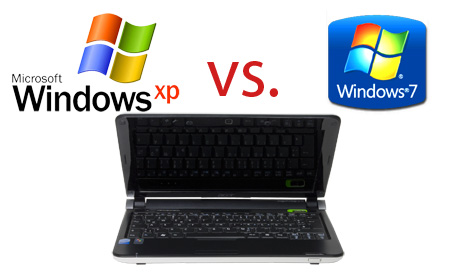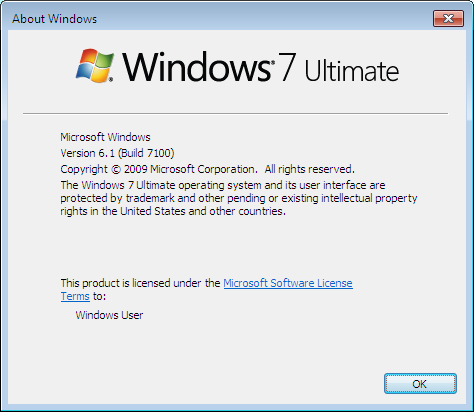Windows 7 Versus XP: Which Belongs On Your Netbook?
Windows 7 On The Horizon
With Windows Vista having never received more than a lukewarm reception (at best), many eyes are now turned towards Redmond in anticipation of Microsoft’s next OS. The company says it has learned from its mistakes and promises to do better this time around with Windows 7. Since it will come pre-installed on most new desktop PCs and notebooks once it is released later this year, Windows 7 will inevitably gain a certain installation base. The situation was different when Windows Vista was released, as many users chose to stick with Windows XP for the time being. That won’t be as much of an option this time, since most companies no longer offer XP. Of course, manually downgrading will still be possible if you have an installation disc and a valid license. On the other hand, Windows 7 is generally being seen in a much more favorable light than Vista anyway. It looks like a lot of users may give Microsoft the benefit of the doubt.
But what about the netbook space? So far, this class of mobile computing device relies on either Linux or Windows XP as its operating system. Considering that the latter was released over eight years ago, it’s understandable that many users are looking for a more modern version of Windows to run on their mobile computing companions. Although it’s possible to install and run Vista on a netbook, we've tried it and it’s not exactly a fun experience, with the system feeling sluggish and overburdened. Besides, most netbooks only come with 1 GB of RAM, which is decidedly too little for memory-hungry Vista.
In May, Microsoft opened the doors to its Release Candidate 1 of Windows 7, allowing users to download the preview and take it for a spin. Of course, the software giant is hoping to establish a firm foothold in the netbook market with its newest version of Windows, promising that Windows 7 will run much more smoothly on the lightweight hardware than its predecessor. Naturally, that piqued our interest. How would Microsoft’s newest OS fare on a current netbook? What’s the everyday user experience like? And, of course, what do the benchmarks say about performance compared to Windows XP?
Get Tom's Hardware's best news and in-depth reviews, straight to your inbox.
-
apache_lives LMAO just as i thought - its a vista renamed and flashed up a bit moreReply
i know - BUY MORE RAM - just might help a little? who knew! -
duckmanx88 apache_livesLMAO just as i thought - its a vista renamed and flashed up a bit morei know - BUY MORE RAM - just might help a little? who knew!Reply
did you even read the article? look at the results. read Benjamin's conclusion. its the moder interface of vista with the functionality of xp. and this is only an RC. who knows what'll happen until the October release. -
l0st_ins0mniac vista sucked ill stick with my xp 02 and 05 till i hear a bit more about win 07Reply -
mitch074 personally, I've found the solution:Reply
neither. I'm a running a Tux on me netbook. I pity da foo' running either da decrepit or da unwashed behind da ears OSes on them netbooks. -
harshavardhanr Windows RC1 installs the ULTIMATE edition by default whereas netbooks that come installed with Windows 7 will have the STARTER edition installed. The Starter edition should be able to perform better and last longer on netbooks because it is (supposedly) optimized for them. Also, it will have far fewer services running in the background compared to the Ultimate edition.Reply
Hence, the conclusion, THE ABOVE COMPARISON IS POINTLESS. -
bigdaddycool Windows 7 is much improved on Vista. Using Vista on a laptop is ok if you have enough cpu power/ram mostly to back it up.Reply
Windows 7 on the other hand in a real world test, say opening up like 10 internet explorers, photoshop and other things....... windows 7 will be alot snappier then Vista, also it uses less ram and less gpu power.
Ontop of that, by default Windows 7 selects the most appropriate power setting for the processor you are using.
Take notice, low-mid range cpu's will be set to Balanced, where as high performance cpu's like quad cores will be set to High Performance by default.
Microsoft took Vista (good gui product a lil run down running wise) and for a better word tweaked it out...... much like tuning a car.
The result is impressive I say for notebook and desktops. However, they really do need to fix their minor network issues and IE8 issues. -
YGDRASSIL Ultimate edition on a netbook and then complain about battery life. Hmmmm. Tommy is really losing it now. Wonder why I still come back here after the old good Tommy was brutally murdered.Reply -
Inneandar It would be nice to see some more 'practical' benchmarks like boot time, app launch times or media playback preformance imho... The conclusion already more or less indicates that win7 felt smooth, but this ain't something you're gonna prove running synthetics. I installed win7 recently on an old laptop (p IV, 512 Mb ram!) and to my opinion it is smoother than the xp previously on it (older install, admittedly). Together with the added functionality, this certainly tips the balance for me.Reply -
pbrigido Very good article! I was wondering with regards to the battery life difference between Win 7 and XP if all settings were set to a similar mode. The huge difference between the two OSs seems to be much larger than it should, even without the most current drivers for 7.Reply


